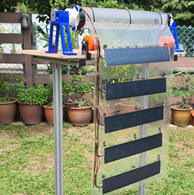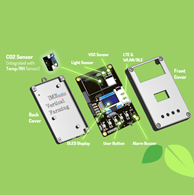A*STAR Makeathon 2021

The first ever A*STAR Makeathon is a creative challenge that invites A*STAR staff to accelerate their innovative ideas into prototypes through the process of making.
This innovation programme will be your opportunity to collaborate with like-minded individuals and create innovative solutions to important problems, all while learning new ways of working and innovating. Most importantly, we want you to have fun while being creative.
This year, we are taking inspiration from the Singapore Green Plan 2030, a national sustainability movement to drive collective action to tackle climate change, and looking for sustainability solutions, especially in the areas of waste management, plastics, and energy.
TEAMS
The first run of A*STAR Makeathon concluded on 8 October 2021 with 3 teams crowned as the winners. We had a total of 9 team shortlisted for Makeathon 2021.
TOP 3
The 3 teams are currently being supported by A*StartCentral to further develop their prototypes.
Email ask_asc@hq.a-star.edu.sg for more details regarding other teams.
| Aeolus | Fero | MetRecycle |
| PLUS | SealGuard | Smart Recycle |
THEME & CHALLENGES
‘Building a more sustainable Singapore: Save Today, Safe Tomorrow.’
Singapore is already feeling the impact of climate change. We are experiencing hotter weather and heavier rainstorms. As a low-lying country, Singapore is vulnerable to rising sea levels.
Singapore has pledged to reduce its emissions intensity by 36% of 2005 levels by 2030. Beyond 2030, we aim to halve emissions from the peak by 2050, and to achieve net zero emissions as soon as viable in the second half of the century. The economy’s largest Greenhouse Gas (GHG) emissions sources are Industry (46%), Power (39%), and Transport (13%).
Singapore aims to be a Zero Waste nation powered by a “circular economy”, focused on removing waste from the resource ecosystem and keeping resources in use for as long as possible. The Government has recently launched the Singapore Green Plan 2030, a national sustainability movement to drive collective action to tackle climate change.
Alongside large-scale carbon capture and other industrial abatement applications, more sustainability solutions could be co-created between Government, businesses and consumers under the Green Plan. Businesses should better understand their impact and close the waste loop. Similarly, consumers have to play a part by changing the way we live, work and play.
Understanding what incentivises and ultimately drives these behavioural changes is as critical to the success of your solution as the use of technology.
Useful links:
Singapore has pledged to reduce its emissions intensity by 36% of 2005 levels by 2030. Beyond 2030, we aim to halve emissions from the peak by 2050, and to achieve net zero emissions as soon as viable in the second half of the century. The economy’s largest Greenhouse Gas (GHG) emissions sources are Industry (46%), Power (39%), and Transport (13%).
Singapore aims to be a Zero Waste nation powered by a “circular economy”, focused on removing waste from the resource ecosystem and keeping resources in use for as long as possible. The Government has recently launched the Singapore Green Plan 2030, a national sustainability movement to drive collective action to tackle climate change.
Alongside large-scale carbon capture and other industrial abatement applications, more sustainability solutions could be co-created between Government, businesses and consumers under the Green Plan. Businesses should better understand their impact and close the waste loop. Similarly, consumers have to play a part by changing the way we live, work and play.
Understanding what incentivises and ultimately drives these behavioural changes is as critical to the success of your solution as the use of technology.
Useful links:
Opportunities & Prizes
Terms and conditions apply.
CONTACT US
Connect with the A*StartCentral community to learn more about our initiatives in Innovation and Entrepreneurships, including the upcoming innovation challenges and programmes for deep tech startups.
Check out A*STAR Makeathon 2022 for a brand new challenge in Health and Wellness in the Digital Age.
Check out A*STAR Makeathon 2022 for a brand new challenge in Health and Wellness in the Digital Age.
A*STAR celebrates International Women's Day

From groundbreaking discoveries to cutting-edge research, our researchers are empowering the next generation of female science, technology, engineering and mathematics (STEM) leaders.
Get inspired by our #WomeninSTEM



